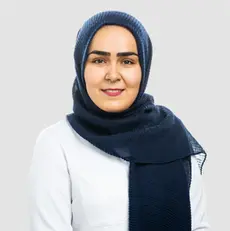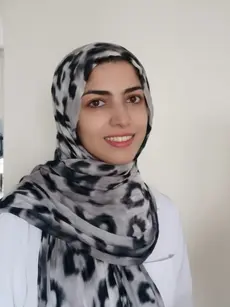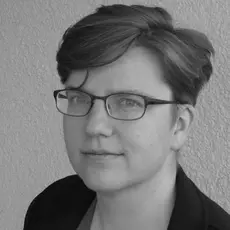DIZH Fellows

Titel und Abstracts in Originalsprache
DIZH Fellows 2025
Maria Anisimova

Harnessing indel history statistics for molecular biomarker detection in viral genomes
Indels amount to ~25% of genomic variation and can serve as molecular markers. Standard bioinformatic pipelines lack analyses of indel dynamics. Recently my team developed indel-aware methods for inferring molecular evolutionary history. Together with the Swiss HIV Cohort Study we will develop indel history statistics for detecting indel biomarkers related to immune escape and drug resistance.
Mattia Battaglia

Zuverlässige Planungsgrundlagen aus Fernerkundung und Thermografie für die lebenswerte Stadt der Zukunft
Die Digitalisierung der städtischen Energie- und Klimaplanung soll durch eine thematische Ausweitung von Forschungsarbeiten zur Auswertung von luftgestützten Thermal- und RGB-Bildern vorangetrieben werden. Im Zentrum steht dabei eine automatisierte Segmentierung von öffentlichen Daten mit KI-Modellen, um verlässliche Thermal- und Oberflächenkarten für verschiedene Anwendungsfälle zu erstellen.
Jasmina Bogojeska

Explainable Multimodal AI for Enhanced Diagnosis of Multiple Chronic Diseases
The fellowship aims to develop innovative explainable multimodal AI methodologies for effective early diagnosis and understanding of multiple chronic diseases impacting large populations in Switzerland and globally. In collaboration with USZ clinicians, it seeks to showcase the methodologies' transferability and utility in clinical practice, ultimately transforming healthcare to benefit humanity.
Firouzeh Ebadi Garjan

Self-powered intelligent indoor environmental sensor
The project focuses on developing a self-powered intelligent environmental sensor that utilizes efficient perovskite solar cells under low-light indoor settings. We aim to optimize the sensor's energy efficiency through machine learning and test its performance in real-world condition. By using ambient light, the sensor operates autonomously, ideal for long-term monitoring with minimal maintenance.
Christoph Heitz

Minimally discriminating AI applications: From legal duty to technical design choices
We will connect legal concepts of non-discrimination with technical design choices of AI developers, for making sure that AI is compliant with non-discrimination laws. This will support developers in creating legally compliant AI applications, and it will help authorities, auditors, and citizens to evaluate AI applications for legal discrimination.
Eduardas Lazebnyj

Advancing Model Performance and Forward Selection Algorithms in Network Science: Applications for Criminal and Corporate Law Enforcement
This project aims to advance network science by introducing the first comparable model fit measure and extending the Forward Selection algorithm to network models. Applying these methods to Swiss data on burglaries and cartels, as well as EU antitrust and court judgment citations aims to deliver real-time software applications for law enforcement agencies and firms.
Monika Reif

Innovative and Challenging Verification Environments for AI-enabled Autonomous Systems
This fellowship focuses on the development of innovative methods for verifying AI-enabled autonomous systems using Artificial Life (ALife), Large Language Models (LLMs) and diffusion models. By creating adaptive, evolving test environments, the research addresses the critical need for robust, trustworthy and safe AI systems in high-risk applications across industries in complex real-world settings.
Pascal Sager

Learning World Models through Actionable Representation for Next-Generation AI
Recent neuroscience studies indicate that the human brain constructs internal models of the world through (inter-)actions, a process likely to fundamentally enhance the generalization, transparency, and efficiency of current AI systems. This proposal aims to incorporate world model learning into AI to enable planning and reasoning, with significant applications in robotics and autonomous systems.
Matteo Spada

Innovative Spatio-Temporal multi-criteria decision analysis Interface to support informed decision-Making for real-world applications (InSTIM)
This project focuses on developing a digital spatio-temporal MCDA tool to support informed decision-making. By integrating Geographic Information Systems (GIS), advanced computational techniques, and real-time data analytics, the tool will allow decision-makers to manage dynamic, evolving challenges. Case studies and stakeholder feedback will evaluate its effectiveness in real-world applications.
Dragan Stoll

AI for Child Protection: Developing and Evaluating Machine Learning Applications for Decision Support in Child Protection
This project aims to develop and evaluate machine learning applications to support evidence-based, unbiased decision making in child protection. Using administrative data and case notes, I will build predictive models that estimate intervention success, ensure algorithmic fairness, and explore practitioner acceptance by applying LLMs for report generation.
DIZH Fellows 2024
Sven Hirsch

Harnessing digital twins for healthcare
We explore the concept of Digital Twin in Healthcare to virtually reproduce patient-specific patho-physiological systems. We will combine data-driven and model-driven approaches using data assimilation techniques and physics-informed machine learning and exemplify these with cases from the clinic.
Christian Rapp

Aligning the teaching of academic writing and academic work with the latest generations of mind-enhancing technologies: A Design-Based Research approach
Advances in digital technologies have reshaped research activities, writing, and scholarly work into a new, seamlessly interconnected field of intellectual practices. This project asks what consequences this has for teaching and offers a complete redesign of a traditional course on academic work.
Alice Aubert

Innovative digital interfaces to support participatory decisions for sustainable development
Deciding for a sustainable future implies trade-offs and requires local decisions processes where the different actors can express their preference on how to address these trade-offs. My project investigates the use of digital interfaces in such deliberative participatory decision processes.
Michelle Haas

Exergaming: Bridging the gap for rehabilitation after musculoskeletal injury
Re-injury of the knee is related to a lack of explosive training and training volume during rehabilitation, and a lack of psychological readiness. These issues could be targeted by dual tasking during exergaming whose effects on movement pattern, cognition, physis, and motivation will be assessed.
Yulia Sandamirskaya

Neuromorphic Technology for Embodied AI
Neuromorphic technology enables robots in highly dynamic and human-centered environments. I integrate event-based vision and spiking neural networks on chip to create new algorithms for 3D scene representation and analysis. This will drive projects on vision-driven automation in life sciences.
Pasquale Cirillo

Machine-Learning-enhanced Climate Risk Measures (MLE-CRM)
Thanks to a unique combination of extreme value theory, Lorenz analysis, and machine learning, the project investigates tail risk and dependence in the cutting-edge area of financial climate risk modeling, providing both the industry and regulators with new reliable tools. A PhD position is funded.
Andrea Günster

Analyzing Illegal Activity: A Data Science Approach
Current research on legal enforcement mechanisms suffers from overreliance on samples of already-detected offenses. My proposal employs new data science methods to better explain, quantify, and forecast illegal activity.
David Jaggi

Detecting Greenwashing: Assessing Green Communication and Technological Trajectories Employing AI and Big Data
This study investigates whether firms' sustainable claims match their actual innovation commitments. I use patent data, corporate communication, and machine learning to assess the alignment between a firm's innovation trajectory and green communication to detect potential greenwashing.
Michael Jüttler

Digital Gamification in Higher Education
Digital learning plays a central role in higher education. Here, gamification elements offer great potential to influence students' learning processes and outcomes. However, there is a lack of experimental studies that systematically prove these influences. This project addresses this research gap.
Andreas Schönborn

From linear to circular planning - steps towards a new paradigm in the planning professions
Based on the industrial use of biochar as an example, the project aims to develop a practice-oriented framework that facilitates circular planning by using digital tools. The aim is the transformation of planning and design processes from linear to circular. All planning professions are addressed.
Malgorzata Anna Ulasik

The Modern Art of Writing: Human-driven versus AI-driven Text Production Processes
The introduction of generative AI tools has caused a substantial transformation of text production. I intend to investigate the new writing strategies by comparing writing processes with and without text generators, and to identify best practices for efficient and effective text production.
Florian Spychiger

DAO ProTool – A Tool for Prototyping Decentralized Autonomous Organizations
This project develops a DAO Prototyping Tool (DAO ProTool) using agent-based modelling to enable DAO designers to simulate different organizational designs. This leads to a Swiss standard for DAO designs, the kickstart of the European DAO research community, and the prosperity of DAOs in practice.
DIZH Fellows 2022
Anne Catherine Gieshoff

"Zoom" ohne "fatigue"? Eine Pilotstudie zum Einsatz von augmented reality bei Videokonferenzen
Kann der Einsatz von augmented reality die "zoom fatigue" bei Videokonferenzen verringern? Eine Pilotstudie mit mehrsprachigen Personen und Konferenzdolmetschern geht dieser Frage nach. Die Ergebnisse bieten eine Grundlage für die Forschung und für die Weiterentwicklung von Videokonferenz-Tools.
Celina Vetter

Elaboration of a methodology and its implementation for processing biometric data to study human performance in the field
In aviation and other industries most incidents and accidents occur due to human error. To improve this it is necessary to understand the operator's behaviour. A methodology to digitalize human performance is applied in training to enrich feedback about fundamental performance aspects.
Claus Horn

Next Level Enzyme Engineering
We propose a novel approach to enzyme engineering which leverages the power of artificial intelligence. By reducing the amount of necessary laboratory measurements we can speed up the process and increase performance. This will greatly advance the field and benefits ZHAW, DIZH and society at large.
Jūlija Pečerska

Joint Alignment and Tree Inference (JATI) for universal applications from biotech to epidemiology
Sequence alignment and phylogeny inference are interdependent fundamental problems that are often solved as independent tasks. I am developing a combinatorial optimisation method to resolve this circularity and efficiently infer both alignments and trees using an indel model of sequence evolution.
Michael Mieskes
Digitale Spuren – Die Wirkungen von digitalen Methoden auf ästhetischen Objekten
Das Forschungsprojekt soll durch interdisziplinären Austausch die ästhetischen Wirkweisen aktueller digitaler Anwendungen untersuchen und sichtbar machen. Physische Objekte sollen die digitalen Einflüsse erfahrbar machen. Eine medientheoretische Reflexion soll die Zusammenhänge aufzeigen.
Steffi Lehmann

Set-up of a combined in silico/in cellulo screening platform to identify novel anti-fibrotic drugs
Fibrotic diseases, characterized by accumulation of connective tissue, are involved in almost 50 % of deaths in the western world. Yet, efficacious anti-fibrotic therapies are still missing. We will develop an unprecedented, combined digital/experimental platform for anti-fibrotic drug screening.
Thilo Stadelmann

Stability of self-organizing net fragments as inductive bias for next-generation deep learning
We recently released "A Theory of Natural Intelligence", proposing a possible key to the emergence of intelligence in biological learners. Goal of this fellowship is to develop a technical implementation of the concept of self-organizing net-fragments within contemporary deep artificial neural nets.
DIZH Fellows 2021
Aline Stoll

Innovationslabor für die digitale Verwaltung Zürich – Aktionsforschung über kollaborative Innovation in Netzwerken
Innovationslabore bieten neue Ansätze für Zusammenarbeit in digitalen Verwaltungen. Das Forschungsvorhaben bringt über einen translationalen Ansatz Grundlagen zu Innovation Capacity in die Praxis. Der Aufbau von Connective Capacity wird am Pilotbetrieb des Innolabs ZH mit Aktionsforschung.
Benedikt Zoller-Rydzek

Digital Firms, Global Taxation, and Location Promotion
In this project, I will investigate the welfare implications of multinational enterprises (MNEs) with digital business models in terms of employment and corporate tax revenues. Additionally, I am going to derive the optimal location promotion policies to attract digital MNEs.
Cerstin Mahlow

SPPC: Swiss Process–Product Corpus of Student Writing Development
SPPC is a novel longitudinal corpus of L1 student writing, linking automatically annotated and aggregated process data with the resulting product (text) and competence data. It will facilitate the development of teaching interventions with appropriate evaluation measures and strategies for feedback.
David Lätsch

Algorithmic fairness in child protection decision-making
In an ongoing study, we are using machine learning to predict the efficacy of child protection interventions in the canton of Zurich. In this new project, we will examine the potential for algorithmic bias in our approach and explore statistical and institutional solutions to the problems detected.
Gernot Boiger

ProcSim - Cloud based Simulation Software for Production Process Optimisation
A modular finite volume simulation model for production processes involving particle-laden flows and Multiphysics dynamic scenarios will be developed. Fusion with our novel Massive Simultaneous Cloud Computing workflow will yield a new generation of digitalized decision aid for process optimization.
Lukas Tuggener

Practical data efficient deep learning trough contrastive self-supervised learning
Deep Learning is the key building block of most modern AI systems, but its data hunger is a problem - especially from an applied perspective. The goal of this project is to enable data efficient practical deep learning by developing novel contrastive learning methods.
Michael Zirkler

Wirkung und Gestaltung von Solidarität: auf dem Weg zu einer digital vermittelten Gemeinschaft
Die Gestaltung positiver und nachhaltiger Beziehungen im Arbeitskontext ist für zunehmend digitale Arbeitsverhältnisse zentral. Im geplanten Projekt sollen bestehende Praktiken untersucht, mögliche Transformationsziele entwickelt und konkrete Handlungsempfehlungen für die Praxis erarbeitet werden.
René Wiederkehr

Automatisierte Verwaltungsverfahren vor verfassungsrechtlichen Herausforderungen: Rationalisierte Interessenabwägung oder digitaler Blindflug?
Automatisierte Verwaltungsverfahren haben vor der Verfassung standzuhalten. Es sind verschiedene Verfassungsgrundsätzen des Verwaltungsverfahrens wie Fairness, Transparenz, Praktikabilität oder Effizienz zu beachten, die in Bezug auf das jeweilige Vorhaben in praktische Konkordanz zu bringen sind.
Ruprecht Altenburger

UxV@BIM: Autonome Systeme mit Building Information Managementsystemen (BIM) vernetzen
Das grösste Potential hat BIM jenseits der Planung: in Bauausführung und Gebäudemanagement, durch die Automatisierung wiederkehrender Aufgaben, für Datenerhebung und Inspektion. Dieser Entwicklungssprung erfordert autonome BIM-fähige Systeme, deren Design und Kommunikation dieses Projekt definiert.
DIZH Fellows 2020
Alireza Darvishy

Accessible digital map and navigation for pedestrians with disabilities
The aim of this research is to develop concepts for accessible urban trip planning and navigation for pedestrians with visual and mobility impairments, and to implement two proof-of-concept mobile application for accessible trip planning and map exploration.
Annina Zysset

Serious Game Approach to improving Writing Skills in School-Aged Children
Impaired handwriting is one of the most common learning disabilities in school children and prevalent in children with attention-deficit/hyperactivity disorder. Serious educational games offer a promising approach to motivate children to train regularly, even those who have difficulties in writing.
Carmen Koch

Digital Literacy für Forschung und Beratung – Anforderungen und Handlungsfelder für das wissenschaftliche, nicht-kommunikationsprofessionelle ZHAW-Personal
Das Projekt bezweckt die Ausarbeitung eines "Digital Literacy Modells und Assessmenttools". Darauf basierend wird die Digital Literacy des nicht-kommunikationsprofessionellen, wissenschaftlichen Personals der ZHAW bestimmt und entsprechende Handlungsfelder für die ZHAW-Departemente ausgearbeitet.
Christian Rapp

Digitalisation and academic writing – new practices and theory development
Writing technology is developing at a breath-taking pace. However, there is a lack of empirical studies that reveal what these technologies mean for writing methodology and pedagogy, and of theoretical work guiding the understanding of digital writing within the academic domain.
Christiane Hohenstein

Digitale Möglichkeiten der Inklusion an Hochschulen / Digital opportunities promoting inclusion in Academia
Die Digitalisierung der Hochschullehre hat enormes Potenzial für die Inklusion von unterrepräsentierten Gruppen wie hörbehinderten Studierenden. An der Schnittstelle zwischen digitaler Transformation und inklusiven Kommunikationsmodi könnten alle Studierenden profitieren.
Christoph Bauer

Physio-App
Die Klassifizierung von therapeutischen Interventionen ist elementar für Praxis und Forschung. Dafür gibt es aber keine für die Praxis geeignete Applikation. Daher soll eine für die Praxis geeignete Applikation für therapeutische Interventionen (Physio-App) entwickelt werden.
Elsa Liste Lamas

LeKoD-CH: ein Schweizer DaF/DaZ-Lernendenkorpus für die Spracherwerbsforschung, -didaktik und -förderung
Im Projekt wird die Version 1.0 des Korpus LeKoD-CH, das erste frei zugängliche, umfangreich annotierte Schweizer DaF/DaZ-Lernendenkorpus, aufgebaut. Das Korpus, welches regelmässig erweitert und optimiert wird, wird als wichtige Quelle für Spracherwerbsforschung, -didaktik und -förderung dienen.
Fatemeh Mohammadi Amin

Real-time dynamic digitalization of Human-Robot Collaboration environments and human-oriented predictive collision avoidance
Enhancing safety and productivity as a main challenge in Industry 4.0 can be addressed by a digital representation of the working zone, human motion prediction and upfront collision avoidance which propose to deliver intrinsically safe and productive systems.
Marcello Righi

Fully digital framework for design optimization of mechanical systems under uncertainty
In the conventional optimisation, a digital model of a "system" (FEM, CFD etc.) is parametrised and optimized. We propose a fully digital framework in which Artificial Intelligence is exploited to make Multi-Disciplinary Optimisation more practically useful an take Uncertainty into account.
Maryam Rezayati

Safe and Cognitive physical human-robot digitalization and collaboration (pHRC)
In this proposal, we aim to address the main challenges of pHRC and propose our solution that how digitalization and AI can be used to tackle the critical problem which does not allow pHRC to be productive and useful for manufacturing especially small medium sized enterprises.
Regina Betz

Carbon Market Toolkit: Building trust and transparency for a net-zero emissions world
Carbon markets are both vanguards and cautionary examples of digital transformation, producing large amounts of data while highly fragmented and poorly regulated. Leveraging AI methods, we propose to develop a toolkit to increase transparency, reduce abuse to increase trust and boost good practices.
Ricardo Chavarriaga

Good practices for responsible development of AI-based applications in healthcare
This project will identify proven methods, practices and standards that support responsible research and development of AI systems for health. They will be tested in use cases from medical imaging and neurotechnology, publicly released and published as a guideline of recommended best practices.
Victor Garcia

Digital Tools for Codon Optimization: Exploring biotech's potential for negative emissions technologies
This project proposes to develop mathematical models that optimize protein production of a gene that stems from one organism in a different organism. The focus protein is suberin, a decay-resistant biopolyester, which stores carbon in soil through roots, serving as negative emissions technology.
Wolfgang Tress

Laboratory 4.0 – Digitization in applied materials research
How can machine-learning approaches complement physics-based modelling of solar cells? How can lab automatization with digital assistants based on artificial intelligence make creative research more efficient? This DIZH fellowship is looking for answers to these questions.
DIZH Fellows 2019
Alexander Posth

ESG 4.0 – Enabling Sustainable and Responsible Investment leveraging AI and Big Data
The identification of optimal Sustainable Investing strategies is still hampered by a profusion of technical and methodological challenges. We propose to utilize patent data and AI to boost Green Finance to a new level of efficiency in mitigating global threats as climate change, and pollution.
Alice Delorme Benites

Machine translation literacy for academics – Pilotstudie zur linguistischen Evaluation der NMT-Übersetzbarkeit von Texten
Das Projekt untersucht das Potential von maschineller Übersetzung (NMT) für wissenschaftliche Texte (Abstracts, Papers usw.) zu Publikationszwecken, indem handfeste sprachliche Kriterien zur Evaluation und Verbesserung der NMT-Übersetzbarkeit erarbeitet werden.
Andreas Hefti

Designing and measuring digital competition
Dieses Projekt untersucht den digitalen Wettbewerb von Wirtschaft und Politik mittels Methoden der Mikroökonomie (VWL), der Psychologie (Attention) sowie der IT (digital auctions). Im Kern steht u.a. ein Beitrag zu Digital Market Design und Data Science (measuring digital attention).
Beatrix Emo

A digital platform for socio-spatial tools
Digital spatial tools are useful to evaluate proposals for urban development and transformation in terms of their likely impact on society. This project proposes a novel digital platform to disseminate such spatial tools amongst relevant stakeholders (architects, planners, developers, local authorities, scientists and the public).
Cerstin Mahlow

Writing Technology for the 21st Century
Writing is essential for societal participation. I will create a systematic overview of research on current digital writing tools & provide important insights into how writers use them, helping us to better understand their needs & identify important challenges for research into digital text production.
Josef Spillner

Smart Cities & Regions Services Enablement (SCReSE)
Software für Smart Cities wird bisher konventionell entwickelt. Auf Basis serverloser und dispergierter Datenströme lassen sich technisch überzeugendere und gesellschaftlich akzeptiertere Smart-City-Dienstleistungen aufgleisen. Dieses Projekt liefert dafür den Beleg in Form eines Prototypen.
Julia Dratva

Digital Child Health Booklet (DCHB)
Digital public health lacks child-centeredness. DCHB provides digital access to child health data and information for public and practice. The applicant will develop a DCHB data concept, investigate ethical, social and technical aspects, and establish digital child health monitoring and research.
Jürg Meierhofer

Design of human-machine interactions in autonomous digital service ecosystems (socio-technical systems)
The interaction of humans and machines is a central component of value creation in future socio-technical service ecosystems. In the proposed project, methods for the design of these systems will be developed, which will play a central role in the digital society.
Marcela Ruiz

Can virtual reality systems help us to design software as we talk? Automating the task of requirements specification
Software systems are omnipresent in digital transformation process. Speeding up the time-to-market while ensuring high-quality software products are of ·crucial value to ensure successful digital transformation. We face this challenge by involving virtual reality systems for software design.
Mathias Bonmarin

Digital dermatology – Studying the impact of digitalization on dermatologists, patients and healthcare
The goal of this fellowship is to study the impact of the digitalization of dermatology on the society. The result will be a white paper to inform and guide the various stakeholders as well as a proposal for the first industry or foundation endorsed Swiss chair in digital dermatology.
Matthias Templ

Anonymisierung und Schätzung des Re-ldentifizierungsrisikos personenbezogener Daten
Die Auswertung personenbezogener Daten mit Machine Learning und Deep Networks versprechen neue Erkenntnisse, jedoch muss dem Datenschutz Rechnung getragen werden. Zentral sind Forschungsfragen bzgl. der Anonymisierung von personenbezogenen Daten und der Schätzung des Risikos vor deren Verwendung.
Michael Gemperle

Chancen und Potenziale digitaler Technologien in der Geburtshilfe
Das Forschungsvorhaben untersucht, wie Gynäkologen/-innen und Hebammen die Potenziale und Herausforderungen digitaler Technologien in der Betreuungs- und Beratungsarbeit wahrnehmen und bringt auf dieser Grundlage mögliche künftige Anwendungsmöglichkeiten und Empfehlungen hervor.
Nico Ebert

Usable Privacy: Kontextbezogene Datenschutzhinweise für Benutzer von Apps
Unternehmen wie Apple oder Signal nutzen kurze, kontextuelle Datenschutzhinweise als Ergänzung zu umfangreichen, oftmals ineffektiven Datenschutzerklärungen. Im Vorhaben soll die Gestaltung und Wirkung dieser Kurzhinweise mittels App-Prototypen in einem quantitativen Forschungsdesign untersucht werden.